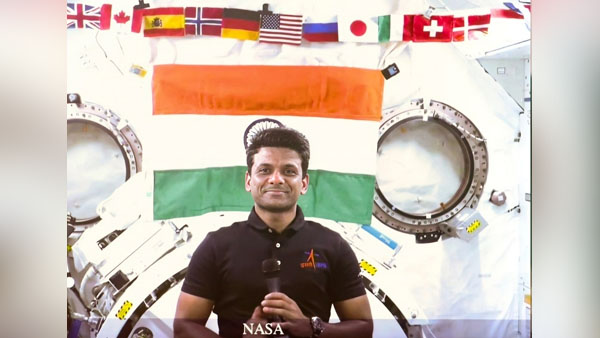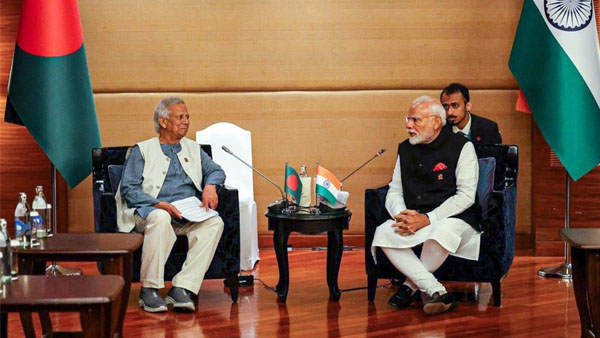By Satyabrat Borah
Shubhanshu Shukla’s journey from computer science to aerospace engineering is a remarkable tale of ambition, dedication, and transformation. His path exemplifies how a solid educational foundation, combined with unwavering determination, can lead an individual from the structured world of coding and algorithms to the boundless frontier of space exploration. Shukla’s story is not just one of personal achievement but also an inspiration for countless others, demonstrating that with the right education and perseverance, one can achieve dreams as lofty as traveling to the International Space Station (ISS). This article delves into Shukla’s educational and professional journey, tracing his evolution from a computer science student to becoming India’s first astronaut to visit the ISS, a milestone that marks a significant chapter in India’s space exploration history.
Born on October 10, 1985, in Lucknow, Uttar Pradesh, Shubhanshu Shukla grew up in a modest family. His father, Shambhu Dayal Shukla, was a retired government employee, and his mother, Asha Shukla, was a homemaker. The youngest of three siblings, Shukla spent his formative years at City Montessori School’s Aliganj campus in Lucknow. This institution played a pivotal role in shaping his early life. Known for its holistic approach, the school emphasized not only academic excellence but also moral values and global citizenship. The disciplined environment fostered in Shukla qualities such as perseverance, responsibility and a strong work ethic attributes that would later define his career. His early education laid the groundwork for his analytical mindset, which would prove invaluable in both his technical studies and his eventual foray into aerospace.
The turning point in Shukla’s life came in 1999, during the Kargil War. At the age of 14, he was deeply inspired by the stories of bravery and sacrifice displayed by Indian soldiers. This ignited a passion for serving the nation, prompting him to aspire to join the Indian Armed Forces. Without informing his family, he applied for the Union Public Service Commission’s (UPSC) National Defence Academy (NDA) entrance examination and successfully cleared it. This achievement marked his entry into the prestigious NDA, where he pursued a Bachelor of Science (BSc) degree in Computer Science, graduating in 2005. His time at NDA was transformative, providing him with a robust academic foundation in computer science while instilling the discipline and leadership skills essential for a military career. The study of computer science equipped him with critical problem-solving skills and an understanding of complex systems, which would later prove instrumental in his aerospace endeavors.
Upon completing his BSc, Shukla joined the Indian Air Force Academy (AFA) for flight training, where he completed the final phase of his degree alongside rigorous pilot training. In June 2006, he was commissioned as a Flying Officer in the Indian Air Force’s fighter stream, marking the beginning of an illustrious career as a pilot. Known by his call sign “Gunjan,” Shukla quickly established himself as a skilled aviator, amassing over 2,000 hours of flight experience. He piloted a range of aircraft, including the Su-30 MKI, MiG-21, MiG-29, Jaguar, Hawk, Dornier 228, and An-32. His expertise earned him the designation of a Test Pilot and Fighter Combat Leader, roles that involved testing the limits of aircraft and evaluating new technologies. This phase of his career honed his technical acumen and operational precision, qualities that would later make him an ideal candidate for space exploration.
While his computer science education provided a strong technical base, Shukla recognized the need to deepen his knowledge to align with his growing interest in aerospace. To this end, he pursued a Master of Technology (MTech) degree in Aerospace Engineering from the Indian Institute of Science (IISc) in Bengaluru, one of India’s premier research institutions. The transition from computer science to aerospace engineering was a significant leap, but Shukla’s analytical skills and technical foundation made it a natural progression. At IISc, he delved into the complexities of aerospace systems, aerodynamics, and space technology, gaining insights that prepared him for the challenges of space exploration. The institution’s rigorous curriculum and world-class faculty helped him bridge the gap between theoretical knowledge and practical application, equipping him with the expertise needed to navigate the intricate world of space missions.
Shukla’s educational journey reflects a seamless blend of two seemingly disparate fields computer science and aerospace engineering. His computer science background gave him a deep understanding of algorithms, data processing, and system design, which are critical in modern aerospace applications, where software plays a pivotal role in spacecraft navigation, control systems, and data analysis. His aerospace engineering education, on the other hand, provided him with the specialized knowledge required to understand the dynamics of space travel, including orbital mechanics and spacecraft design. This unique combination of skills set him apart, enabling him to approach complex challenges with a multidisciplinary perspective.
In 2019, Shukla’s career took a historic turn when he was selected as one of four astronauts for India’s ambitious Gaganyaan mission, the country’s first human spaceflight program. The selection process, conducted by the Indian Air Force’s Institute of Aerospace Medicine, was rigorous, evaluating candidates on physical fitness, mental resilience, and technical expertise. Shukla’s extensive flight experience, combined with his academic credentials in computer science and aerospace engineering, made him a standout candidate. In 2020, he traveled to Russia’s Yuri Gagarin Cosmonaut Training Center, where he underwent intensive astronaut training alongside his fellow Gaganyaan candidates. The program covered critical skills such as survival techniques, physical conditioning, and adaptation to microgravity environments. After completing this training in 2021, Shukla returned to India and continued specialized training at the Astronaut Training Facility in Bengaluru.
The pinnacle of Shukla’s journey came when he was selected as the mission pilot for Axiom Mission 4 (Ax-4), a commercial spaceflight to the International Space Station. This mission, a collaboration between Axiom Space and the Indian Space Research Organisation (ISRO), marked a historic milestone for India. Shukla, alongside American astronaut Peggy Whitson, Poland’s Sławosz Uznanski-Wisniewski and Hungary’s Tibor Kapu, embarked on a 14-day mission to the ISS. As the first Indian astronaut to set foot on the ISS, Shukla made history, becoming the second Indian to travel to space after Rakesh Sharma in 1984. During the mission, he conducted 60 microgravity experiments from 31 countries, including seven proposed by Indian researchers, contributing to advancements in fields such as materials science, biology, and fluid dynamics.
Shukla’s transition from computer science to aerospace engineering was not merely a change in academic focus but a testament to his ability to adapt and excel in diverse domains. His computer science education provided him with the analytical tools to tackle complex problems, while his aerospace engineering training gave him the specialized knowledge to navigate the challenges of space exploration. Together, these disciplines enabled him to excel as an astronaut, where precision, problem-solving, and technical expertise are paramount. His ability to integrate knowledge from both fields underscores the importance of interdisciplinary education in addressing the demands of modern science and technology.
Beyond his professional achievements, Shukla’s personal life reflects the same dedication and balance. Married to Dr. Kamna Mishra, a dentist, and father to a four-year-old son, he values family and maintains a grounded perspective despite his extraordinary accomplishments. In his spare time, he enjoys physical exercise and reading science-related books, activities that keep him mentally and physically prepared for the demands of his career. His journey is a powerful reminder that success is not solely the result of talent but also of relentless effort, continuous learning, and a willingness to step beyond one’s comfort zone.
Shubhanshu Shukla’s story is a beacon of inspiration for India’s youth, demonstrating that with the right education and determination, even the most ambitious dreams can be realized. His journey from a computer science student to an astronaut aboard the ISS highlights the transformative power of education and the limitless possibilities that arise when one dares to dream big. By combining his technical expertise with his passion for exploration, Shukla has not only achieved personal success but also elevated India’s standing in the global space community. His legacy will undoubtedly inspire future generations to pursue careers in science, technology and space exploration, proving that the sky is not the limit—it is just the beginning.




